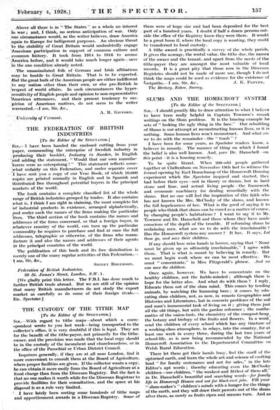THE CUSTODY OF THE TITHE MAP [To the Editor of
the SPECTATOR.]
SIR,—With regard to tithe maps—about which a corre- spondent wrote to you last week—being transported to the collector's office, it is very doubtful if this is legal. They are for the benefit of the tithe-payer, not primarily for the tithe- owner, and the provision was made that the local copy should be in the custody of the incumbent and churchwardens, or in the office of the Parochial or Urban District Council. •
Inquirers generally, if they are at All near London, find it more convenient to consult them at the Board of Agriculture, where proper facilities are given. If the collector wants a copy, he can obtain it more easily from the Board of Agriculture at a fixed charge than from the Diocesan Registry. But the fact is that no ong makes it worth while for the Diocesan Registrar to provide facilities for their consultation, and the space at his disposal is as a rule very limited.
' I have lately been sorting some hundreds of tithe maps and apportionment awards in a Diocesan Registry. Some of them were of huge size and had been deposited for the best part of a hundred years. I doubt if half a dozen persons out- side the office of the Registry knew they were there. It would be a great boon if, where the local copy is wanting, they could be transferred to local custody.
A tithe award is practically a survey of the whole parish. It gives the acreage, the rental value, the tithe due, the names of the owner and the tenant, and apart from the needs of the tithe-payer they are amongst the most valuable of local records. It is a great pity that those now in the Diocesan Registries should not be made of more use, though I do not think the maps could be used as evidence for the existence of






































 Previous page
Previous page